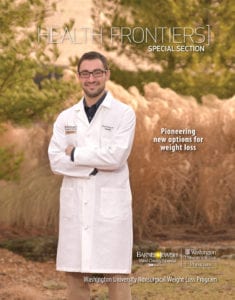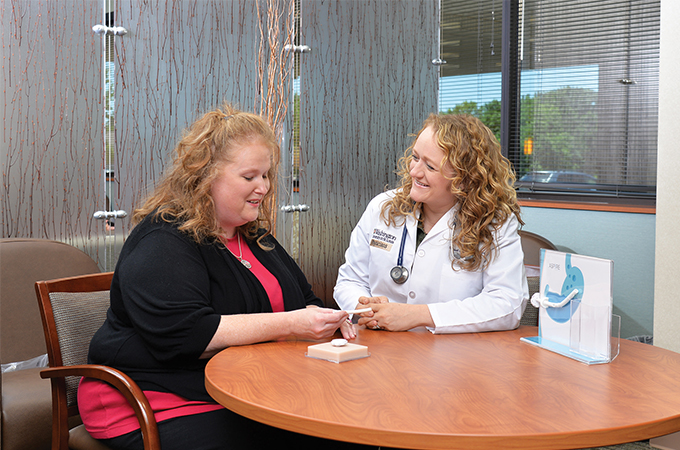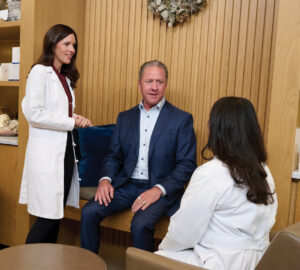Cape Girardeau resident Tia Fadler says she tried various weight loss plans over the years, but never achieved much more than temporary success. Each time, her hopes went up as her weight went down, but the pounds would always return. Hoping to break the cycle of frustration and improve her health for good, Fadler met with Washington University gastroenterologist Dr. Vlad Kushnir and nurse practitioner Rachel Maday at Barnes-Jewish West County Hospital.
They decided Fadler was a good candidate for aspiration therapy, a recently FDA-approved technique developed by Washington University researchers that prevents the body from absorbing a portion of the calories in already ingested food. The minimally invasive, physician-monitored process takes some time and commitment, but it produces good results for adults who need to lose a significant amount of weight, Kushnir says.
 In an outpatient visit, a tube is endoscopically placed through a small abdominal incision; then, two weeks later, a port is placed at the end of the tubing, flush to the abdomen. A small exterior companion device can then attach to the port three times a day—after each meal—to remove about one-third of the patient’s food before it’s digested. The system is known as AspireAssist. “In its clinical trials, the average total body weight lost was above 14 percent in the U.S. and up to 19 percent in Europe,” Kushnir says. “Of all the endoscopic weight loss procedures, this is one of the best and least invasive.”
In an outpatient visit, a tube is endoscopically placed through a small abdominal incision; then, two weeks later, a port is placed at the end of the tubing, flush to the abdomen. A small exterior companion device can then attach to the port three times a day—after each meal—to remove about one-third of the patient’s food before it’s digested. The system is known as AspireAssist. “In its clinical trials, the average total body weight lost was above 14 percent in the U.S. and up to 19 percent in Europe,” Kushnir says. “Of all the endoscopic weight loss procedures, this is one of the best and least invasive.”
Patients can keep performing aspiration as long as needed to achieve their weight loss goals, and they receive nutrition and lifestyle counseling to help them stay healthy during and after therapy. “I read about aspiration and thought it might be a good fit for me,” Fadler explains. “I’m a surgical neurophysiologist, and the demands of being at work and on call don’t allow me much down time. I knew bariatric surgery and a long recovery period wouldn’t work for me.” She began using the AspireAssist system at the end of March, and is about 40 percent of the way to her 100-lb. weight loss goal. “It’s been very manageable for me,” Fadler says. “I can shower, swim and do regular activities with no problem. [The port] doesn’t show through my clothes, so no one knows I have it unless I tell them.” She adds that working with Washington University medical staff has been a very positive experience. “They’re very supportive, and I like that I get to meet with a dietitian each time I come for a follow-up visit,” she says.
Aspiration therapy is designed for patients with a BMI (body mass index) between 35 and 55, Kushnir says. It can be a good choice for people with obesity-linked conditions such as diabetes, arthritis and high blood pressure, especially those who have had trouble losing weight by other means. “The process really gets patients thinking about a different relationship with food,” he notes. “They learn how to eat slowly and mindfully, chew more thoroughly, drink more water and not snack during the day. These are behaviors they need to be successful with aspiration therapy—and with maintaining their weight in the future.”
Pictured: Patient Tia Fadler consults with nurse practitioner Rachel Maday.
Photo: Bill Barrett
Washington University Physicians offers a complete slate of services to help patients maintain a healthy weight and a healthful lifestyle. For details, visit barnesjewishwestcounty.org/nonsurgical-weight-loss or call 314.362.2652.
Cover courtesy of Washington University Physicians








